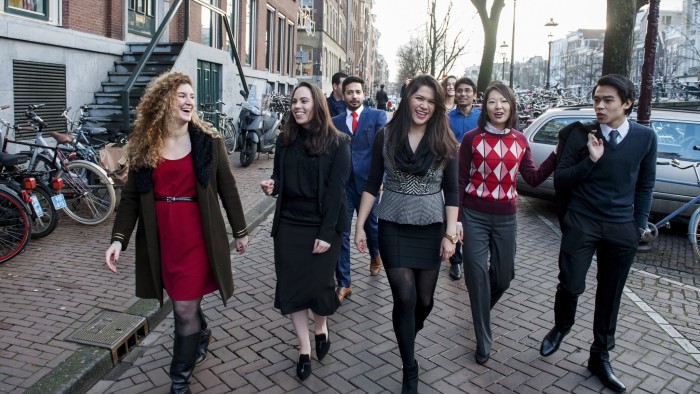Nationality grants open doors to MBA hopefuls

Roula Khalaf, Editor of the FT, selects her favourite stories in this weekly newsletter.
Kelly McCracken can thank her family ties for her place at business school. The 26-year-old claims case manager at Liberty Mutual in Boston will start her MBA at the University of Edinburgh Business School with most of the £27,400 tuition fees paid because her great, great, great, great, great-grandfather, William McCracken Jr, was born in the Scottish capital in 1744.
The scheme, called “I Love Scotland” and funded entirely by the school, is a scholarship only offered to Americans able to prove Scottish ancestry. It is part of a broader strategy by the school, ranked 91st in the Financial Times MBA top 100, to raise its profile in the US, rather than merely “welcoming folks home”, according to Mette Friis, head of marketing, student recruitment and admissions.
Scholarships targeted at specific nationalities are increasingly being used for MBA recruitment campaigns. Programme directors now build scholarships into their course budgets as a necessary cost of getting the best students. Nationality-based scholarships are also popular because they can improve diversity in the classroom and widen the talent pool on masters courses, industry insiders say.
“It is now an essential part of the equation,” says David Asch, a director at the European Foundation for Management Development (EFMD), an MBA accreditation body.

Many nationality-specific scholarships are funded by donations from alumni and companies, says Caroline Diarte Edwards, director of Fortuna Admissions and a former admissions director for the MBA programme at Insead. But these are hard to allocate, because there can be strings attached to accepting other people’s money. “When I was at Insead, we had scholarships we weren’t able to award because they had a particular target and we didn’t have any suitable students,” says Ms Diarte Edwards. By funding the scholarships themselves, schools can reach more applicants.
Scholarships are increasingly important to students as tuition fees have risen in recent years: average MBA fees on the FT’s top 100 courses are now equivalent to 8.7 months of gross annual salary three years after graduation, up from 6.2 months in 2006.
Just under 70 per cent of MBA students polled last year by CarringtonCrisp, an education researcher, said they would be more likely to consider a business school if they received a scholarship. Co-founder Andrew Crisp says business schools risk eroding their financial modelsby making scholarships too available. “Not every student should get a scholarship.”
Melbourne Business School has just launched what it calls its Hellenic scholarship, covering its A$85,470 ($63,000) tuition fees and some living costs.
Only available to Greek nationals who secure a place on the school’s MBA programme through the general application process, its creation reflects Melbourne’s position as host to the largest Greek community outside Europe, according to Alex Christou, director of corporate relations and partnerships.
Greek students tend to be at least bilingual and many have two undergraduate degrees, he says. One aim of the scholarship scheme is to send MBA talent back to Greece — a country plagued by economic malaise — with the hope of improving the situation on the ground, according to Mr Christou.
“This is [for] the new generation of Greeks, emerging from a country devastated by economic and political woes.”
At Nyenrode Business Universiteit in the Netherlands, the Orange Tulip scholarship has helped MBA students from Brazil, China, Indonesia, Mexico, Russia, South Korea, Thailand and Vietnam study at the school since 2010.
The grant is funded by Nuffic, a government agency jointly controlled by the Ministry of Education and Ministry of Foreign Affairs, as part of an effort to build links between the Netherlands and countries with different student intakes. For example, in South Korea more women than men take MBAs.
Fabiola Osornio is among those on the MBA course this year thanks to an Orange Tulip scholarship. The 28-year-old first came to the Netherlands during an exchange visit from her home country, Mexico, as a part of her bachelors degree. She is using a bank loan to make up the shortfall in her living expenses while completing her MBA, and says she could not have funded the study in the Netherlands by herself. “A big door was opened to me,” she says. “This is a big investment.”
Applicants who meet the scholarship’s nationality criteria and secure a place on the MBA programme can receive a discount of up to three-quarters of the tuition fees, which this year are €37,500.
But this award is less generous than in the past. As Javier Arias, the school’s international marketing manager, puts it: “We used to offer 100 per cent, but some people only wanted to come because of the scholarships. We didn’t want them if that was the case — so we changed it.”
Comments